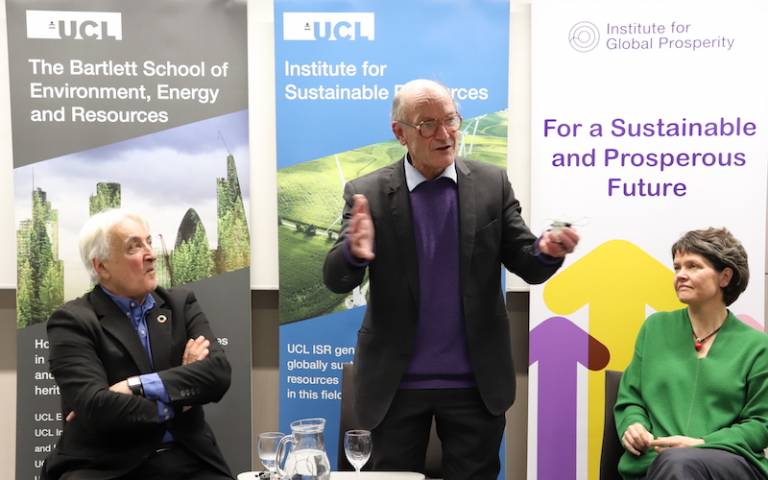Blog: Herman Daly Remembered at the UCL Institute for Sustainable resources
24 January 2023
A special commemorative event was held recently at the UCL Institute for Sustainable Resources (ISR) to mark the passing of ecological economist Herman Daly, in collaboration with the UCL Institute for Global Prosperity (IGP)

Photo image: Robert Constanza, Paul Ekins and Kate Raworth speak as part of the Panel Q&A during the event
Herman Daly: rooting economics in the ecosystem
The event heard from six speakers all of whose work had been profoundly influenced by Daly’s thought and writings: Professor Robert Costanza (IGP), who worked with Daly from the early 1980s, and co-founded with him the International Society for Ecological Economics in 1989; Professor Paul Ekins (ISR), whose first edited book in 1986, The Living Economy, had a contribution by Daly; Sandrine Dixson-Declève, Co-President of the Club of Rome, the 1972 book from which, Limits to Growth, had a significant reference to Daly’s work; Dr Ida Kubiszewski (IGP_, whose academic work has further developed Daly’s Index for Sustainable Economic Welfare (ISEW, in his book For the Common Good), Professor Tim Jackson (University of Surrey), whose 2009 book Prosperity without Growth develops one of the central themes of Daly’s thinking; and Kate Raworth, author of the best-selling 2017 book Doughnut Economics, which reflects many of the themes central to Daly’s output.
Each of the speakers presented aspects of Daly’s work that had been most influential on them personally. Costanza highlighted that for Daly an ecological economy had an ecologically sustainable scale, socially fair distribution and economically efficient allocation. Ekins noted two areas where Daly’s insights were at radical odds with mainstream neoclassical economics, but absolutely in line with scientific understanding. First, that the economy is a sub-system of the ecosystem, and that the characterisation of environmental impacts as ‘externalities’ was profoundly perverse. Secondly, that Daly’s understanding of human agency as ‘person-in-community’, rather than the ‘rational economic man’ of neoclassical textbooks was much more in line with how humans actually behave. Raworth credited Daly with the creation of a whole new paradigm, away from the conception of the economy as a circular flow of money to one rooted in the need for ecological sustainability and social justice, from which she had fashioned her ‘doughnut’ of a social floor within planetary boundaries. Kubiszewski went in more detail into the ISEW indicator, and showed how it had evolved into the Genuine Progress Indicator, which had now been calculated for a number of countries. And Jackson talked about the foundation of Daly’s thinking on a deep commitment to ethics and morality.
One of Daly’s key ideas was that of a Steady State Economy and his belief that this was inconsistent with continuing economic growth. This issue divided the speakers, with some stressing the implausibility of decoupling rates at the speed required to adequately reduce greenhouse gas emissions and other critical environmental impacts, and others pointing to how technology and innovation had achieved considerable decoupling in some areas notwithstanding rather weak application of policy.
In discussion, a query from the floor wondered why, despite the evidence power of these ideas, they had so far not been influential on either mainstream economic thought or the political policies that so often flowed from it. A number of reasons were put forward for this, including an ‘addiction’ to economic growth, misinformation from vested interests, the power of the advertising industry and a failure to understand the dire nature of the environmental problems facing humanity – what Daly called ‘the wild facts’. It was felt that there was a real risk that a general realisation of the importance and validity of Daly’s work would only emerge once he had been proved disastrously right. Avoiding such an outcome requires a robust challenge to outmoded economic models that continue to ignore the ecological foundations of human development. And in so doing helping to realise the equitable transformations that Herman Daly so compellingly called for more than 40 years ago.
Photo credit: Amanda Kartikasari
 Close
Close

